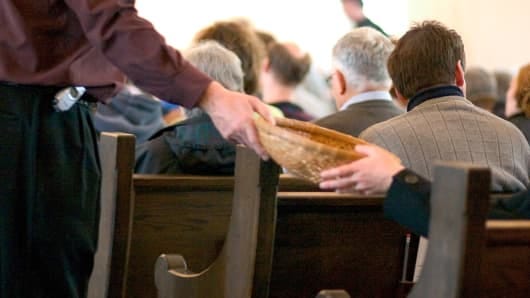Over the weekend, I led a retreat with the new worship committee at Community Unitarian Universalist Congregation in White Plains, NY. I am part of the interim ministry team there this year, and part of my work there this year will be helping to build a strong worship committee that is an active partner in the liturgical work of the congregation.
In the course of the wonderful and generative retreat, I asked the attendees to name the things about their worship that they loved, that they were missing, and that they were not fond of - and I was surprised to hear “passing the offering baskets” as one of them.
I suppose I’ve never really thought about it much, as it’s just… what we do. But two people spoke eloquently about how the act of passing the basket feels like being guilted into giving. They feel judged by others near them if they don’t put something in the basket, even if they just sent their generous pledge payment.
Now we did move on fairly quickly to solutions, like electronic giving and baskets at the back/at coffee hour, but I have been thinking about the feeling those participants surfaced for the last few days, and I suspect they are not alone in feeling this way.
How much pressure does the basket put on folks? Folks who give in other ways? Folks who don’t have enough? Folks who simply don’t have cash? I sat with this, and remembered times that I could not contribute… and yeah, memories of shame and guilt came rushing up to the surface.
We want to be generous people. We want to be able to talk about money and address the shame and embarrassment those who have less feel at almost every turn. We love our programs to share the plate with other organizations, and we work hard to make the offering an invitation, not a demand.
And still. People feel guilted into giving.
I don’t have any solutions that aren’t the practical ways to not physically pass the plate during worship. Which, of course, is one solution. But how do we shift the act of giving into one that is kinder and maybe less about ‘the work of the congregation’ and more about actual, heart-led commitment and connection?
And… is there a way we can do this element of worship better, in ways that don’t feel like an NPR pledge drive commercial break (“If you like this programming, support us now”)? Can we find ways to not have it interrupt the arc of the worship service but rather be interwoven more elegantly?
I think it comes down to this: how do we practice not just generosity, but the invitation to generosity?
Let’s start the conversation.






I hear you. My family is sick of hearing me holler at the radio, "You can't have my old car, I'm using it!"
Passing the plate though, is one of the few elements left in our touch-free covid world where we still physically hand something around. Am I the only one who feels a communion in keeping the plate aloft and handing something to the person next to me?
My economic privilege prevents shame from being my overriding plate experience, so maybe my point here is moot. I wish it was normal and okay for someone to put a quarter in the plate, if that is what they can give, and feel it is enough.
As always, you piqued my curiosity and I found this article about the origins of passing the plate.
https://www.christianitytoday.com/history/2009/march/passing-plate.html?utm_medium=widgetsocial